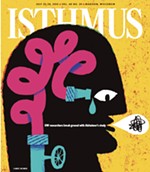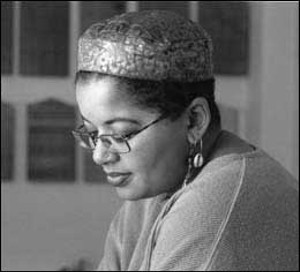Faith Adiele
Meeting Faith: The Forest Journals of a Black Buddhist Nun
W.W. Norton, 288 pages
www.adiele.com/
An account of her ordination as a Buddhist nun in Thailand, Meeting Faith is wry, observant and forthright about Adiele’s spiritual confrontation with herself. “I’m not even what is seen as a practicing Buddhist,” writes the Harvard graduate and Iowa Writers’ Workshop alumna. “I don’t meditate regularly; I nurse anger; I despise tofu.” Now an assistant professor of English at the University of Pittsburgh, Adiele is the subject of My Journey Home (a documentary that aired on PBS in April), the daughter of a Nigerian father and Nordic-American mother, and is working on another memoir, Twins: Growing Up Nigerian/Nordic/American.
David Medaris: What a great title! How did Meeting Faith come to you?
Faith Adiele: Thank you! Because of the hybrid nature of the book (part memoir, part travelogue, part spiritual diary, part anthropological research), I wanted a title that would work on multiple levels. Serendipitously (or rather, thanks to Mom), I have a name that works as a play on both the search for self/identity, and the spiritual quest. Finding Faith sounded too 700 Club; Looking for Faith sounded too Bobby Fischer; so Meeting f/Faith it was.
Q: Your spiritual journey calls to mind Soen's koan, "Ten years searching in the deep forest/Today great laughter at the edge of the lake," but if you could reduce your text to a koan of similar length, how might you phrase it?
A: What a great (and accurate) description! I’m not sure I can top that combination of hard struggle and humor, plus the sense of place. Can I steal this one? Here goes...One season thrashing through the underbrush/Today sunlight warms the path, the stream.
Q: Who was your intended audience, and how has your intended audience differed from the audience that Meeting Faith has found?
A: I was surprisingly naïve in terms of audience. Bernard Cooper talks about this, anticipating interest in one’s style and genre, but then being ghetto-ized by topic. I too imagined that folks interested in literary memoir would run to the book simply for the carefully-crafted sentences. They would swoon over my metaphors and witty asides. The sidewalks would be littered with literary casualties. I hoped to lure adventurers and armchair travelers. Readers interested in international or multicultural or coming of age literature. College classrooms studying literary nonfiction, journals, travel literature, spirituality, Africana studies, women’s studies. It actually never occurred to me that Barnes & Noble would put me in Spirituality/Eastern Thought, or that hardcore Buddhists would find value in my novice experience.
Q: To what or to whom do you attribute your skepticism, your sense of humor and your willingness to be forthright in print? How do you reconcile the first two with Buddhist practice?
A: My family, hands down. They gave me my first training in arts and activism – question everything, put yourself on the line, but do it beautifully, and keep ’em laughing. I was pleasantly surprised to discover that my upbringing fit beautifully with temple life. Forest Buddhism in general, and the headnun in particular, encouraged me to test everything for myself, and to be brave. And though we weren’t rolling in the aisles and peeing our sarongs, Buddhism has a gentle, generous humor to it. It seems to accept (and be amused, not outraged, by) our (imperfect) humanity.
Q: Who or what is your muse?
A: History!
Q: What was the last book you read that you would recommend, and why would you recommend it?
A: I’m currently teaching a course on travel literature about Africa and the Caribbean, which means I get to read terrific stuff. If I had to choose one, I guess it would be The Shadow of the Sun by the great Polish journalist/writer Ryszard Kapuscinski. He’s such a wry, gutsy, human traveler who blends current events with an understanding of history. He lets us see Africa as this vibrant, joyful, diverse place.
Q: What book from your childhood left the greatest impression on you?
A: I have to thank you for this question! I drew a blank (my childhood lasted a long time, and there were many books) until my mother reminded me that for years I slept with with Marassa and Midnight by Morna Stuart next to my bed. The title refers to twin slave boys in Haiti at the time of the Revolution. One is taken to France while the other runs away and lives in the jungle. They long for a reunion. My new book, called Twins, is a memoir about growing up in the USA with my Nordic-American mother and longing to meet my Nigerian father and siblings – including a sister who looks exactly like me. It was uncanny to realize the connection!
Q: Why do you live where you live?
A: Hmm...I live in the USA because I’m morbidly obsessed with reality television. I live in Pittsburgh because the job is great. I just bought a house in an area called Polish Hill, because it’s close to the university yet also close to downtown and the warehouse district (and I’m hoping the little old ladies in my neighborhood are generous with the homemade piroghis). I chose my house because it’s Victorian on the outside yet newly rehabbed inside; it’s not too large for the single gal who doesn’t like to clean; and it has a fabulous bathroom and patio for entertaining.
Q: Which of your senses do you most rely on?
A: Smell! When I was a kid it took me hours to finish a smellalicious meal ’cuz I had to sniff each bite. My poor mother was ready to pass out. When I travel I collect scent souvenirs to unlock muscle memory later.
Q: What is your favorite meal?
A: Either something Moroccan with pigeon pie and lamb on a rooftop garden at night, or a New England lobster boil with bare feet and Capri pants. I do remember some fine Nepali and Afghani meals in Madison, however.
Q: What are you afraid of?
A: What we are doing/letting happen to Africa.
Q: What brings you joy?
A: Travel, and cooking for a long table of old friends and new acquaintances.
Q: What is in your CD player?
A: Asian underground from London, and a compilation of Hip-Life (West African Highlife meets with Hip Hop) I brought back from the clubs in Ghana.
Q: What is your favorite Web site, and why?
A:
sanrio.com, ’cuz I’m waiting desperately for Chococat to dethrone that Target sell-out Hello Kitty, and I’m not afraid to admit it.
Q: If you were to sell the naming rights to your next book, who would you solicit?
A: I actually have solicited my former trashy novel co-authors (three college pals known collectively by the penname Jane Harvard), who are a force of wit with which to be reckoned.
Q: Do you have any tattoos?
A: For better or worse, I missed that boat. Some years back when I was trying to change my life, I explored the idea of getting a tattoo that would replicate the body painting the women of my tribe do in Nigeria as rites of passage. It’s called uli and has influenced an entire generation of Nigerian visual artists. I experimented with temporary mehindi designs, but couldn’t find anyone who knew what s/he was doing. Once everyone started getting tattooed butterflies and cartoon characters, I sensed the end of Western civilization. When Meeting Faith came out, the friend who designed the layout, Shari DeGraw of Iowa City, created this gorgeous stationary for me using uli designs and traditional colors, so I finally have my tattoo – coming soon in an envelope near you.
David Medaris is a staff writer at Isthmus, the Madison, Wis., alternative newsweekly.


